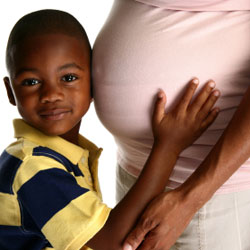Mom, Dad...where do babies come from?

You’re pregnant with your second, your sister-in-law is about to give your child a little cousin or he’s just simply curious by nature. Whatever the case, sooner or later the question is going ot come up : « Mommy, Daddy… where do babies come from? You find yourself a bit embarrassed, maybe a bit confused. What should you say? What should you not say? Your thoughts go around and around from the birds and the bees to the cabbage patch to the stork.
Avoiding the question is not the answer and talking about the stork will only mean that the question is going to come up again one day. Sooner or later, the question will arise and you’ll have to have some answers. Tell yourself that an opportunity to have your first real conversation about the subject and that it will set a good foundation for when they’re adolescents and you have to elaborate on the subject once more.
Forget the stork and the cabbage patch
When children are very young you can use language imagery : Mommy and Daddy love each other and they want to have a baby. They touch and hug each other, and Daddy pus a little seed in a place in Mommy’s stomach that’s made especially for holding babies. There, another little seed that belongs to Mommy is waiting and the two seeds come together to become a baby that grows with the help of the same food that nourishes Mommy. This is jsut one suggestions; you know better than anybody else if your child is ready for more detailed explanations and you’ll be able to tell this by his reaction.
What do you when the « little seed » story doesn’t do the trick anymore?
The more your child grows up and is exposed to the outside world the more curious he will be and the story about the « little seeds » won’t cut it anymore. His friends will talk, the opposite sex will start to intrigue him – maybe it’s time to go into a bit more detail without but without getting too scientific, or explicit. When talking about the « little seeds » is not enough, it might be time to talk about the parts of the anatomy by name, talk about eggs and sperm, about the uterus and the umbilical cord and explain them that mom and dad are making love.
Tips to help you
The important and possibly the most difficult thing is to find age-appropriate words bto suit the maturity of each child. If you find this too difficult, there are many books with appropriate illustrations to each age that can be fouind in the Family Resource Library at the MCH. Take for example That new baby : an open family book for parents and children together by Sara Bonnett Stein, or The new baby by Jane Carruth. For older children, there is Life by Lennart Nilsson, which is a superb book that illustrates the magic of life.


